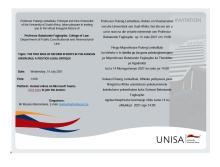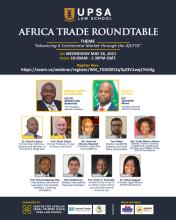African Union
Call for Application: Director, Centre for Human Rights, University of Pretoria
August 20, 2021
The Centre for Human Rights, University of Pretoria, is inviting applications for a new Director
The University of Pretoria wishes to invite applications for the following vacancy at the Centre for Human Rights (an academic department and a non-governmental organisation at the University).
University of South Africa presents Professor Babatunde Fagbayinbo's Inaugural Lecture themed: "The Two Eras of Reform Efforts in the African Union (AU): A Politico-Legal Critique"
July 2, 2021
Professor Puleng LenkaBula, Principal and Vice Chancellor of the University of South Africa, takes pleasure in inviting you to the virtual Inaugural lecture of:
Professor Babatunde Fagbayibo, College of Law: Department of Public Constitution and International Law
Topic: The Two Eras of Reform Efforts in the African Union (AU): A Politico-Legal Critique
Africa Trade Roundtable under the theme - “Advancing A Continental Market through the AfCFTA”
Afronomicslaw.org Academic Forum Guest Lecture Series: "Trade Facilitation: The Key to a Borderless Africa"
Call for Application: Master's, Doctoral and Postdoctoral Research in International Law, University of Pretoria
May 18, 2021
The South African Research Chair in International Constitutional Law in the Faculty of Law (UP Law) at the University of Pretoria (UP), Prof Dire Tladi, invites applications for full-time Research Master's / Doctoral / Postdoctoral candidates commencing in 2022.
The relevant areas of research to which this call relates are:
(a) The law of International Organizations, including the United Nations and the African Union
5.6.2021
News: 4.15.2021
AfSDJN Civil Society Forum Message on Mounting Sovereign Debt of African Countries
March 23, 2021
Message to the African Ministers of Finance, Planning and Economic Development
On
Mounting Sovereign Debt of African Countries 23rd March 2021


